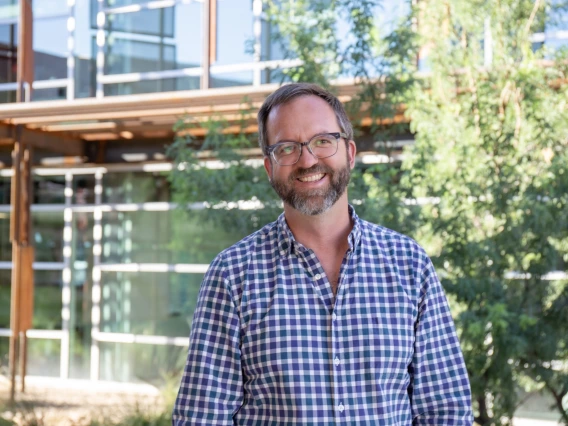
Tyler Meier, executive director of the University of Arizona Poetry Center, will receive the 2024 Friend of the Humanities Award from Arizona Humanities.
The award recognizes Meier for promoting the humanities throughout his 11 years at the Poetry Center, with Arizona Humanities citing the Art for Justice grants program, which commissions work from writers exploring mass incarceration and supports the work of incarcerated writers, and the Climate Change + Poetry series, which highlighted the role of poetry in the planet's climate future. The award will be presented at the Hands-on-Humanities Awards ceremony on Oct. 5.
“Through this award AZ Humanities is honoring Tyler’s exceptional leadership of the UA Poetry Center. With the Poetry Center’s extremely creative and hard-working staff, Tyler has kept poetry at the forefront in addressing some of the most difficult questions of our time, humanities concerns that affect us all,” said Gail Browne, who was the Poetry Center Executive Director from 2002 to 2013 and submitted the nomination.
Alain-Philippe Durand, Dorrance Dean of the College of Humanities, lauded Meier for “actively and tirelessly promoting understanding and appreciation of the humanities in the community.”
“Mr. Meier’s entrepreneurial spirit, passion and kind determination are contagious and he succeeds in motivating his staff and board in following him in proposing new, innovative, events, programs, and development campaigns,” he said. “He is indeed making a lasting contribution to the cultural life of Arizona communities.”
Q: How does the Poetry Center contribute to the cultural life of Southern Arizona communities?
“The fact that the Poetry Center exists at all is a testament to Southern Arizona, and to the people who make their lives here. It’s a joy to work every day with my colleagues imagining ways we can both honor the magnificence of poetry as an art form and connect poetry to the everyday experiences of our community, in all the nuance and complexity of those experiences. Wallace Stevens said that poetry is a preserve for the imagination—a place where our imaginations can flourish. By that logic, I like to think of the Poetry Center as a kind of national park for the imagination—a place where we can let our imaginations roam wild and free. There are very few places like it in the world.”
Q: In terms of promoting the humanities, what can be accomplished through specific programs, like the Art for Justice grants and the Climate Change + Poetry series?
"Culturally, we turn to poetry during moments of great significance in our lives. We use the power of the art form to give us the best language we can have at that moment. I think we often recognize in the poet’s voice our own experiences of joy, or of loss, or hope, etc. It’s a communal connection that requires being in relationship, and at its core, I think this is what the humanities are all about.
“Poetry also can respond quickly to the substance of our lives—it is one of our most flexible art forms. It can be a powerful voice for issues of social concern, and it can remind us of the stakes. One aspect of justice, I think, is seeking to return to a right relationship. Poetry can help us get into right relationship with the grief and trauma that often accompanies the truth, and it can empower us to think in new ways about the agency we have. I believe deeply that art is site where this part of justice—of returning to right relationship—is possible. I think poets are essential to the solutions for our most vexing challenges.”
Q: In what ways can poetry create a sense of belonging in our communities?
"We have been thinking a lot about belonging at the Poetry Center, and are launching the Belonging Initiative as one of our next flagship efforts. Our interest is manifold, but it stems from the underlying understanding that a major cultural deficit in contemporary American life is belonging. That understanding is further supported by social science research and even an advisory from the Surgeon General on the public health impacts of loneliness. The building blocks of belonging are embedded in what poetry does best—allowing us to look deeply into ourselves while showing us simultaneously how we are connected to others, often through the spectrum of a human register of emotions: grief, hope, joy, pain and more. What connects us to the things that matter in our lives? We think poetry has a lot to say in helping us build the capacity for belonging and we’re excited to explore answers in innovative new ways."

